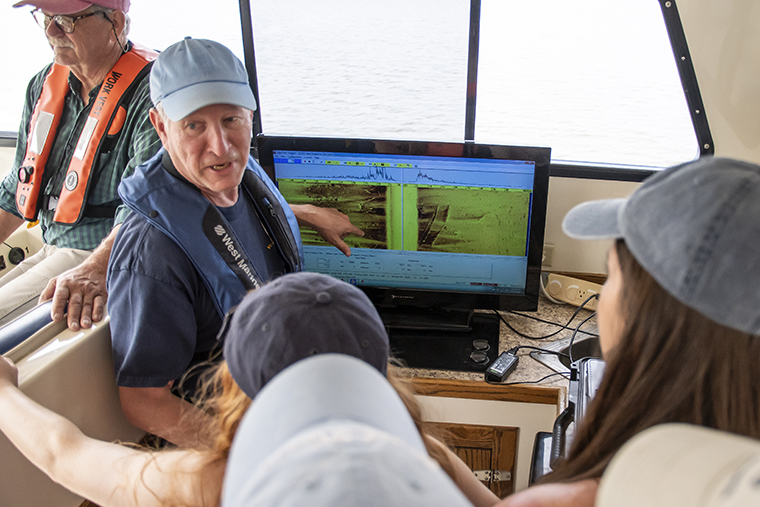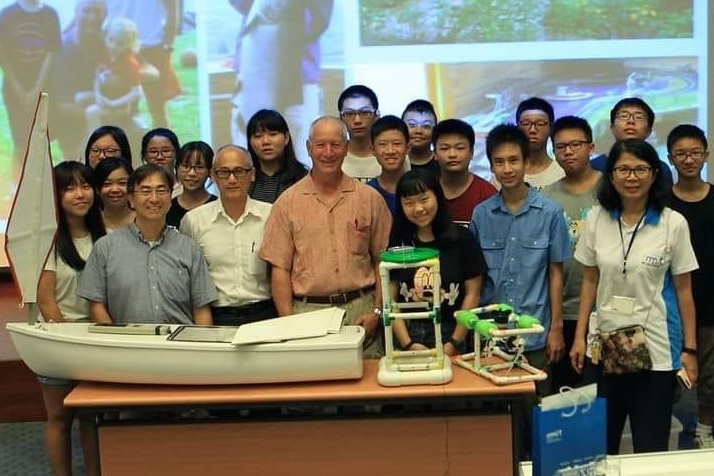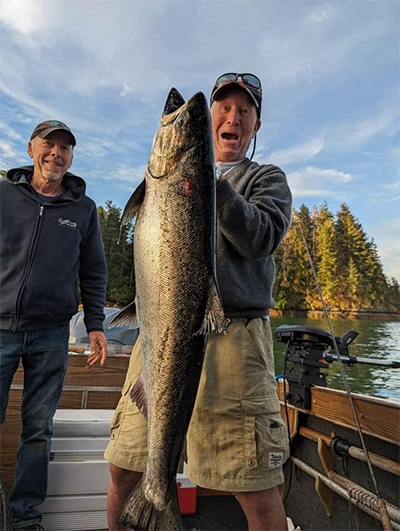Recently Retired Professor Dies in British Columbia
Marine geology professor and leader of the Watershed Innovation Lab Doug Levin was on a fishing trip when he passed away Sunday, August 20.

Doug Levin explains the use of sonar for underwater research to students aboard the College's research vessel, the R/V Callinectes.
Levin joined Washington College as the associate director of the Center for Environment & Society (CES) in 2011 and retired last January as the Center's chief of entrepreneurial science.
“Doug was one of the most inquisitive, generous, warm-hearted, and funny people I've ever known,” said John Seidel, CES director emeritus, who hired Levin. “He had an amazing knack for reaching students and developed a large fan club over the years. He brought some truly remarkable technologies to Washington College, especially for undergraduates, and he has left a lasting impact. He will be deeply missed.”
A coastal geologist and marine scientist by training and an educator by temperament, Levin immediately began a mapping and water quality program for the Chester River upon his arrival at Washington, innovating as he went. He established research programs using buoy-based sensors and robotics, and he adapted both programs to teach undergraduates.
Levin expanded technical resources and opportunities for students during his 12 years at the College. He used his contacts in NOAA to acquire a 27-ft survey boat, the Lookdown. The additional boat and Levin's work to outfit it with the latest remote sensing equipment allowed CES to offer graduate-level research experiences to undergraduates. His sensor innovation also led to grants from the Maryland Department of Commerce to support key staff positions at CES.
The Watershed Innovation Lab at Semans-Griswold Environmental Hall was designed by Levin as a custom-built lab equipped with the tools and technologies for students to do aquatic research in myriad ways, from volunteering to internships.
Levin was generous with his time to colleagues, giving guest lectures in various classes. He taught marine geology for several years in the Department of Environment Science & Studies and was a stalwart contributor to Washington College's interdisciplinary Chesapeake Semester. His infamous “Ruining your Day at the Beach” session on Assateague is still talked about by his students for its infectious and engaging approach – a series of rapid-fire questions to students, challenging them to think and to ask questions, and opening their eyes to the complex processes that form coastal barrier islands. He liked to quote “Doc” Edgerton, one of his earliest mentors, who said, “teach so that they don't realize that they're learning until it's too late.”
Levin also conducted considerable outreach to K-12 teachers and students. Thanks to his skill at teaching students of all ages, Levin could get children to design and operate a remotely operated vehicle in the pool in a little more than an hour. He and his colleagues provided professional training to every science teacher in Kent and Queen Anne's counties and made available loaner kits of technology resources. Levin even acquired and equipped an old ambulance as a mobile lab to deliver programming directly to schools. He shipped buoy kits and led workshops throughout the United States and abroad.
 Doug Levin with students and colleagues in Taiwan behind a table with some of the
sensors and devices for gathering aquatic data that he used to teach students at Washington
College and around the world.Levin broadened CES's geographic reach significantly with his activity in the European
Marine Science Educators' Association and the Asia Marine Educator Association. He
conducted research worldwide and often included students in his international work,
such as having Washington College students present with him at a 2016 conference in
St. Petersburg, Russia.
Doug Levin with students and colleagues in Taiwan behind a table with some of the
sensors and devices for gathering aquatic data that he used to teach students at Washington
College and around the world.Levin broadened CES's geographic reach significantly with his activity in the European
Marine Science Educators' Association and the Asia Marine Educator Association. He
conducted research worldwide and often included students in his international work,
such as having Washington College students present with him at a 2016 conference in
St. Petersburg, Russia.
Prior to joining Washington College, Levin worked with EG&G, a leader in marine remote sensing technologies; the US Army Corps of Engineers; Bryant College; the University of Maryland Eastern Shore; and the Chesapeake Bay Office and the Integrated Ocean Observing System, both within the National Oceanic and Atmospheric Administration (NOAA). He was then called to serve as a NOAA technology advisor in the BP-Deepwater Horizon oil spill, designing programs to track oil in the water column and sediments in partnership with BP, the US Coast Guard, and the US Environmental Protection Agency.

Levin is survived by two sisters, Jennifer and Debbie; and seven children, Eric, Elliot, Leslie, Andrew, Dustin, and Donald; and 10 grandchildren (Emily, Zachary, Jake, Cade, Cooper, Harper, Maggie, Benton, Freddy, Teddy) plus one on the way (Maya).
“Doug had a deep love for his family, his cabin on Little Creek in Preston, and his golden retrievers and cats," Seidel said. “He also deeply loved his students. He has left a legion of students who cherish their memories of his off-beat, infectious, and engaging teaching and who benefited from his generosity of spirit and long-term mentoring and support. Despite all of Doug's many other professional accomplishments over a distinguished career, he would be the first to say that these students are his most important and lasting legacy.”